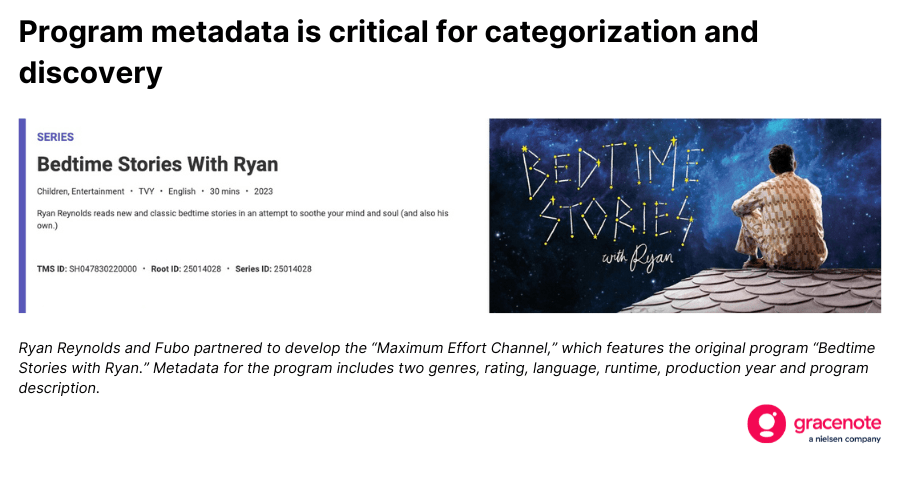With more choice than anyone could ever watch in a lifetime, it’s easy to think that there’s never been a better time to be a TV viewer. The reality, however, is that the explosion of choice has made it increasingly difficult for people to find something they’re interested in. While this challenge is prevalent across all TV options, it’s particularly relevant in the free ad-supported television (FAST) universe, which continues to gain traction among audiences.
In addition to competing with a wide range of video on-demand (VOD) services and traditional TV channels, individual FAST channels compete with the hundreds of other channels above and below them within individual platforms. And that challenge magnifies when the programming lacks key information audiences need to determine if they’re interested in it. And somewhat surprisingly, this is a common shortcoming.

A recent analysis, for example, found that almost one-third (31%) of the TV programs submitted to Gracenote’s FAST database for metadata enrichment lacked genre information. Many were also missing other metadata elements that facilitate content discovery, such as imagery, parental rating and production year.
The implications here are clear.
At a very high level:
- A service/platform can’t properly categorize it.
- Viewers won’t know if they’d be interested in it.
- Brands won’t know if they want to advertise against it.
It’s doubtful that programming would make its way into a service without critical program information, but any platform-provided metadata would lack the uniformity to ensure interoperability across other platforms. It’s also possible that program-provided information could be inaccurate or incomplete, especially if it was added without human editors.
The good news in this scenario is that the creators submitted their programs for metadata normalization and enrichment. This fortified them with industry-standard metadata and images before being made available to audiences.

On the other hand, the scenario highlights how metadata is often overlooked in the FAST industry—even with respect to the basics, like genre, production country, original air date, rating and imagery.
The importance of metadata
To understand the importance of metadata is to understand the challenges viewers face when trying to find something to watch. Content and service choice have become overwhelming, and audiences are looking for ways to quickly find something they’re interested in. A recent LG Ad Solutions survey, for example, found that 56% of audiences now prefer to watch streaming video than traditional TV, but they’re spending 12 minutes looking for something to watch (up from five minutes a year ago). And a full 70% prefer ad-supported content, which is right in FAST’s sweet spot.
The appeal of FAST is clear. In the U.S., TV audiences have more than doubled their FAST viewing over the past year: In April of last year, Pluto TV and Tubi accounted for 1.8% of total TV usage. A year later, those services plus the Roku Channel, accounted for 3.9%1.
And on an individual service level, audiences spent more time watching Tubi in February, March and April 2024 than they did with Peacock, Max and Paramount+.
Despite the prowess we see in aggregated viewing time with any individual platform, it’s important to remember that individual FAST services have hundreds of channels, each of which can come from a variety of sources. And the services noted in The Gauge represent only a sampling of what’s available to audiences. Smart TVs from LG and Samsung, for example, come preloaded with their own FAST offerings, and smart TVs now dominate the TV market. As of April 2024, 72.6% of U.S. TV households had an internet-enabled smart TV2.
Importantly, the relevance of metadata isn’t limited to TV programs and movies. While the early days of FAST hinged on offering classic TV and programming that bigger VOD services weren’t interested in, FAST is evolving to feature news and sports content—two genres that are known audience drivers for scheduled programming.
Gracenote’s recent analysis, however, found that sports programming was just as metadata-deficient as TV shows and films: 31% were missing genre information, 20% were missing ratings information and 9% were missing description language.
Through the lens of this recent analysis, the FAST industry is still very much playing catch up with respect to metadata. Basic program information is foundational for all programming, but it will be insufficient in next-generation viewing experiences that will enable personalized viewing experiences, competitive content curation, rich search functionality and optimized advertising opportunities.
Notes
- Total time with TV includes time with live, time-shifted and CTV content; Nielsen National TV Panel
- The U.S. Bureau of Labor Statistics’ CPI is a measure of the average change over time in the prices paid by urban consumers for a market basket of consumer goods and services.
For additional insight into the needs of FAST content heading into the future, download our FAST toolkit.
Missing metadata in FAST programming may be hindering ad revenue
FAST channels will become increasingly dependent on metadata to inform ad buys in programmatic systems.
Streaming has viewers captive in a fractured CTV landscape
Streaming viewers have become overwhelmed by choice and fragmentation. This sentiment is mounting, and it has a range of downstream effects.
The streaming paradox: More content has led to less satisfaction
Viewer frustrations are on the rise as streaming service congestion increases, highlighting opportunities for improved UX and content discovery.